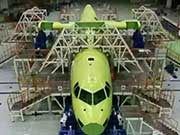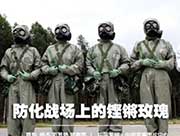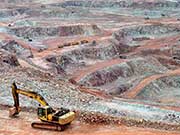

San Francisco, July 20, (People's Daily Online)----Johnson Chen, a Chinese engineer working for an American chip design company in San Jose, capital of Silicon Valley, recently shows his concern about the company's future.
"I was sold twice before I work for this one." he said, " I am worried now because some other groups have already been cut during the past weeks." Even though his manager asked him to "show more leadership when you send emails and talk to others."
He joked the acquisition of the former working companies and his transfer to the new one as "he was sold". And he is not sure whether he will be sold again or not. "That depends on the selling of products for Samsung and other cell phone companies."
He is only one of the Chinese engineers in the valley, a world-famous innovation hub which is considered flooded by Chinese and Indians. Although there is no specific number about Chinese engineers here, some tech giants' statistics may reveal a little bit. Google publicly released its workforce demographics that 31 percent is Asian. Xuhui Shao, vice president of Yahoo engineering, advertising and data told the reporter that almost half of the staff in its Sunnyvale company are Asians.
For those Chinese engineers, some have ambitions to climb higher at the corporation ladder, to create more values for the society, or to found their own companies, while others have already planned to get retired.
Buying houses and preparing for retirement
After his graduation from China's Tsinghua University, Tao continued his studying of computer engineering at the University of California, Irvine. Good performances and four-month test engineering internship sent him into Google, a software engineer.
Five-year working experience at Google makes this early thirty years old engineer a typical Silicon Valley techie, wearing hoodies, T-shirts, shorts and slippers to the office during work days.
"After I have about 20 houses, I will retire," Tao said. He told the reporter that he was planning to travel to Seattle in June to look for investment housing. According to a recent study by the real-estate brokerage Redfin, one in four people based in the San Francisco Bay Area are searching for homes in other regions of the country. In 2011, it was one in seven. Seattle has seen the biggest increase in searches by Bay Area Redfin users, rising from 1.2% in 2011 to 5.1% in the first half of 2015.
He didn't say how many houses he has already had. But he has one in Sunnyvale, a two-story townhouse seeking roommates last week.
Buying houses and renting out is not rare for the Chinese engineer here in Silicon Valley. Jacky works at another high-tech company. He bought a house last year with three bedrooms. Now he lives in one and rent the other two.
For Tao, buying 20 houses seems not that difficult when his dream slipped out of his tongue. He said that the housing price in Seattle is much less than in San Francisco. "With about 120 thousand US Dollars, you could buy a nice studio," said he.
Glassdoor lists that based on 230 salaries posted anonymously by Google Senior Software engineers, the average annual salary for them in Mountain View, the headquarter of Google is $164,251. With share and other bonus, Tao said that he could get approximately and grossly $300, 000.
"If I fulfill the dream earlier, I can retire earlier," he said. "What will you do in your retirement if you are still young?" I asked. He answered without hesitation "Do whatever I like, such as traveling or living in other countries, because I am free."
Reviewing 2-3 proposals per day
Wei is a venture capitalist. Sometimes he has to get up at 5:30 a.m. starts from home in San Jose, drives along US 101 and through congested the San Francisco City to meet entrepreneurs in cafes, incubators and workshops.
He was born in 1988 and started his career as an angel funder two years ago. "I reached about 1600 programs during the past two years, invested more than 26, and one third has entered next round," he said, "I reviewed 60-80 projects monthly with an average of 2-3 every day."
He has a team consisted of investors from Silicon Valley, New York and China. He always tries to persuade other wealthy young people to join his team. "Money rewards is important. What's more important is that that you write part of history. When you get older, you could tell your children that these big companies were invested by your parents." "That's cooler than spending money on luxury brands. You maybe just do a little and but that may change the whole world," he added.
Talking about his dream, he said "Paypal mafia is quite well-known in VC circles both in China and Silicon Valley, I hope there is similar Chinese group that we can call it Chinese Mafia." Now he has already tried. He said" I almost take every opportunity to pitch Chinese companies and Chinese business models to get recognition from local Chinese or American Chinese. "
He said that during the past two years "I have realized that increasing our influences is more important than trying hard to get involved into their culture."
Return or not return, that's the question
2015 is the second year for 25-year-old Xiong to work in China with his role changing from a Duke University graduate to the co-founder of Ghost Drone, an unmanned aerial vehicle controlled by a smart phone app. Before he returned to China, he developed a dating app with partners and ran it in one incubator in San Francisco. The company was founded in April, 2014. It takes one year to grow the company from 2 founders to more than 100 staff with consumers from 70 countries. In the end of 2014, the company gained $ 10 million Series A led by GGV Capital.
After two years' working at one software company in Silicon Valley, Hui went back to China earlier this year. He quit the job and sold his shinning black Infiniti car. Different from Xiong, who found his partner and project in China, Hui returned with his own project and his partner, a married man with two boys. Both of them have decent jobs and easy life.
Innovation and entrepreneurship is like blood running through Silicon Valley. Almost everyone gets used to talking about or hearing starting a new business or disrupting an established industry. "But all of a sudden, you find that almost everyone is talking about startups in China," said Jerry. He wants to go back to China."But I still have some concerns," said he.
"China now gears up to unleash the potential of innovation with various supports and incentives which are quite attractive. However, I don't know whether I can get used to the culture as well as the environment there. " He added that "I saw the entrepreneurs' enthusiasm and aspiration for quick money and investors' craze and chase for programs in China. That's quite different from Silicon Valley."
There is no statistics showing how many Chinese return to start business in this reverse brain drain trend. However, return or not is always a question that tests entrepreneurs' ambitions.
 |
Day|Week

 China starts assembly of world’s largest amphibious aircraft
China starts assembly of world’s largest amphibious aircraft PLA's only woman CBRN emergence rescue team
PLA's only woman CBRN emergence rescue team Stunning! Gorgeous girls practice yoga on 2,000-meter-high cliff
Stunning! Gorgeous girls practice yoga on 2,000-meter-high cliff PLA Air Force fighter aircraft in action
PLA Air Force fighter aircraft in action A glimpse of China's Zijinshan gold & copper mine
A glimpse of China's Zijinshan gold & copper mine Be an ageless goddess like them
Be an ageless goddess like them Hot figure show in SW China
Hot figure show in SW China Evolution of Chinese beauties in a century
Evolution of Chinese beauties in a century